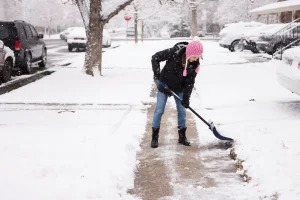
BACKGROUND: I grew up in Townsend, MA and graduated from UMass, Amherst with a forestry degree. After graduation, I was offered a position with the US Forest Service and moved to Northern California. I became the first fulltime professional female forest service ranger in the region. During that time, I worked in several different capacities - logging sales, recreation management, snow ranger & chairlift inspector, etc. While in CA, I met my husband, Rick Flint, who was in ski resort management. Over the years we’ve lived and worked in southern NH, western Maine, and at 10,000 ft. in southern Utah (with an avg. snowfall of 400” a year). I’ve also owned and operated a bed & breakfast in Maine and managed the lodging reservations department at Sunday River Ski Resort. We have resided in New London since 2000.
MY REAL ESTATE CAREER: My real estate career started in Utah in 1994. I feel I bring a breadth of experience and calmness to every transaction. I have a direct, no-nonsense approach and my goal is to make sure buyers and sellers have the information they need to make good decisions so they can be successful in achieving their goals. I always have my clients’ best interests at heart. I’ve won many awards including realtor of the year and was an active member of the Sunapee Region Board of Realtors for years (including serving as president one year).
FAVORITE QUOTE: “Remember, being happy doesn’t mean you have it all. It simply means you’re thankful for all you have.” ~Unknown
FUN FACTS: I paraglided while on a ski vacation in Verbier, Switzerland, have skied at over 60 different ski areas, been white water rafting on a class 5 river, and even tried parachuting in my younger years (once!). We happily boated on Lake Sunapee for 16 yrs. I enjoy volunteering at the local food pantry and my best vacations so far have been in the Cook Islands and also the Azores!

With both mortgage applications and showings up since the start of the year, it is clear that there are already more people actively looking to buy than in the past few years. This is great news if you are looking to sell! As Spring nears, and buyers get more excited about finding a home, we expect that this activity will continue to pick up!
Reach out to take advantage of our accumulated vast local expertise, experience, and insight. We’d love to make YOU our next success story!

FUN FACTS: I grew up in West Hartford, Connecticut, graduated from Mt. Saint Joseph Academy in 1966, University of Denver, BA in 1970 and Plymouth State University, MEd/Mathematics in 1999. I have two great sons: Brooks (who is married to Olivia), and Tyler. I am also most fortunate to spend time watching my two grandsons, Hazen (14) and Hudson (11) participate in various extra curricular activities.
OCCUPATIONS: I have lived in New London for 53 years and have been selling Real Estate for 46 of those years! I also have an established relationship with the Kearsarge Regional School District, which began in 1972 when I taught 4th grade. In 1978, I began a 12 year stint on the KRSD School Board and was Chairman for 6 of those years. In 1993, I was asked to substitute at KRMS for a three week 8th grade Mathematics position that lasted 20 years! I retired from KRMS in 2013. I have also been a Director of the New London Outing Club and the New London Historical Society, Chair of the New London Hospital Day Parade and currently serve as a member of the New London Planning Board as well as the New London Representative on the Tri-Town Assessors Board. I am also the vice chairman of the New London Bicycle and Pedestrian Advisory Committee.
FAVORITE SAYINGS: “After all is said and done, more is said than done.” “Good, better, best, never let it rest until your good is better and your better is best.” “No one can make you feel inferior without your consent.” ~Eleanor Roosevelt
INTERESTS: Family! Friends! Laughter! All things outside ~ skiing, walking, tennis, travel, the ocean, gardening, bike riding (I even purchased an E-Bike several summers ago so I could keep up with my grandsons on their bikes, I LOVE IT!).
STRENGTHS: I feel my 53 years of living and raising my family in this spectacular area has provided me with the expertise needed to put buyers and sellers together with very positive outcomes!
TESTIMONIAL: “Emily Campbell is a gifted people person. Selling my home was an incredibly emotional experience for me. Without any judgment, ever, Emily helped me navigate and balance the components of my emotional needs with what she knew made good business sense. I will be forever grateful to her for guiding me gently through the process, for her open and timely communication, for her understanding and respect of my feelings, and for making sure that we found buyers who would love the house as much my family did. Emily is a genuine treasure.” Seller, New London

Now is a great time to start getting your house market-ready! Here are some helpful tips!
- Declutter & Clean: These are two of the most important and cost-effective ways to increase value. Remove excess décor, deep clean the entire house, and minimize what you keep on countertops.
- Repairs & Maintenance: Focus on key repairs that you would want to see if you were a buyer. An agent can narrow down your repairs for the best return on investment.
Reach out to take advantage of our accumulated vast local expertise, experience, and insight. We’d love to make YOU our next success story!

The post "Houseplants That Can Survive Weeks Without Water" appeared first on Better Homes and Gardens Real Estate Life.
Do you love having houseplants but forget to water them? If you’re like us, your perfect home would be filled with greenery—lush hanging potted plants and counter and tabletop plants everywhere. But again like us, your forgetfulness probably gets in the way of your plant-filled dream. And, your busyness. Amazingly, though, some houseplants can survive weeks without water. That means, you can have the green and lush home you want without having to constantly replace dead plants or worry you’re going to kill them. All plants indeed need water and most require it regularly. But, many species thrive on minimal watering and several can live up to a month without a drink. Here are some gems of houseplants to consider if you’re away from home often, too frenzied to deal with regular plant watering, or just plain prone to forgetfulness.
Rubber Plant
Also known as Ficus elastica, the rubber plant is a fast-growing houseplant that does best in low- to medium-water conditions, meaning you only have to water it moderately every 15 days or so. During fall and winter, rubber plants require even less water—a good dousing every month or so. The rubber plant loves bright filtered sunlight and can grow up to 10 feet tall indoors, in the right conditions.
Spider Plant
The spider plant needs a bit of attention (regular watering) in its initial growing phase, but if you can get past that, you’ll be good to go with a beautiful plant you only need to water now and then. When fully grown, water your spider plant every seven to 10 days during spring and summer. In wet and humid conditions or cold weather, you can get away with watering it every 20 to 30 days.
Snake Plant
The snake plant is perfect for the forgetful gardener. In most indoor conditions, you only need to water it every 10 to 20 days (depending on where you place the plant). During winter and in wet weather, you can ignore it even longer. This gorgeous and hearty houseplant has striking dark-green sword-like leaves, sometimes with cream, silver, or white variegation. It thrives in low to bright light and grows up to four feet tall.
ZZ Plant
Leave a ZZ plant without water for a month and it’ll be as vibrant as ever when you pay attention to it again, as long as you place it in indirect sunlight. This easy-to-care-for houseplant loves a good soaking and then prefers to be left alone for a few weeks. Too much water causes rhizome rot, which can kill the plant. This slow grower has a stunning leathery look and can get up to three feet tall and wide.
Cast Iron Plant
The cast iron plant is another houseplant that only needs occasional watering. It actually does best in low water conditions, so saturate it and then don’t touch it again until the top level of soil dries out. If cared for properly (which we trust you will), this lively plant will grace your home with beautiful dark green foliage that grows up to two feet tall.
Succulents and Cacti
Succulents and cacti thrive in the desert, so they’re going to love receiving minimal water in your home. They’re tough and do extremely well in dry soil. You’ll only need to water them every month or so because they retain water in their leaves. Just make sure your succulents and cacti get plenty of sunlight and place them in a pot with drainage holes.
Zebra Haworthia
The zebra haworthia, also called zebra cactus or zebra plant, is one of the easiest houseplants to care for. It stores water, so it can thrive for days in dry soil (you’ll only need to water it when the top layer of soil looks dry). Zebra cactus also loves bright, indirect sunlight. It stays small—less than a foot tall and wide—and is an attractive plant that goes well with modern decor.
Sago Palm
The sago palm is a popular slow-growing plant that gives a space a tropical look. It loves dry soil, and once it establishes its root system, you only need to water it every two to three weeks. Sago palms have striking leathery dark-green fronds that can grow up to three feet long and the plant can get up to five feet tall.
Aloe
The aloe plant also carries water in its leaves, so it can thrive for up to four weeks without watering (if you place your aloe in the sun, you may have to water it a little more frequently). This beauty that has spiky, toothed leaves is one of the easiest houseplants to care for. A healthy and happy aloe plant can reach up to three feet in height.
Are you looking to sell or buy a new home? Let Better Homes & Gardens Real Estate® walk you through the process.
Source: Better Homes and Gardens Real Estate Life

Inflation makes day to day expenses unpredictable, but a fixed mortgage stabilizes your biggest monthly expense. Whereas if you rent, the rent price will rise over time, often faster than the rate of inflation.
Owning real estate is one of the strongest ways to gain equity. Renting does not provide that capability. As a renter, you pay more without gaining any financial benefit.
Thinking of making the move from renting to owning? Get in touch! We’d love to make YOU our next success story!
The post "Buying a Home May Help Shield You from Inflation" appeared first on Keeping Current Matters.


If you’re thinking about selling this spring, now is the perfect time to start getting ready. Below are some key steps to take.
- Declutter: Remove excess décor, unnecessary belongings, oversized furniture. Minimize what you keep on kitchen and bathroom countertops.
- Depersonalize: Buyers need to visualize themselves living there. Remove family photos, religious items, unique collectibles, lawn ornaments, etc.
- Clean thoroughly: Deep clean the entire house, including floors, windows, appliances, and bathrooms.
- Paint if needed: Neutral colors are the gold standard when it comes to selling.
- Repairs & Maintenance: Address any needed repairs or deferred maintenance. Service the furnace, get chimney cleaned, service the generator, etc.
Contact me if you would like help prioritizing what you need to be doing now so you spend time and money on projects that will pay off when you sell.
 |
Donna ForestM: 603-731-5151donna@donnaforest.com Follow her on Facebook |
The post "Essential Home Maintenance Tips for End of Winter Storms" appeared first on Better Homes and Gardens Real Estate Life.
If you haven’t performed your annual home maintenance checks this winter, don’t think you can avoid them because the season’s almost over. End-of-winter storms are wreaking havoc on homes across the country, and homeowners who don’t maintain their properties to combat storms will likely incur costly repairs and possible health risks. Heavy wind, rain, ice, and snow can threaten your home’s structural integrity and damage critical systems. Frigid winter temperatures usually force homeowners to rely on indoor heating systems that may fail if not taken care of properly. Don’t be caught off guard because the weather is fine now. Attend to crucial yearly maintenance as soon as possible to save money, stay safe, and keep peace of mind. Here are some essential home maintenance tips you can review and take action on to avoid the surprise of damaged property, unsafe conditions, and costly repair bills.
Inspect Carbon Monoxide and Smoke Detectors
Chilly weather often prompts homeowners to fire up the furnace or gather around the fireplace. For those who don’t have properly functioning carbon monoxide and smoke detectors, however, warm days and nights indoors might turn into family health risks. Make sure you test your detectors and change the batteries at least once this season, and keep in mind that carbon monoxide detectors typically last for three to five years, while smoke detectors last for eight to ten years.
Protect Pipes
Don’t neglect your plumbing if you live where water freezes. Protect your pipes from freezing and bursting by taking preventative measures like installing frost-proof spigots or closing interior shut-off valves leading to outdoor faucets. Wrap pipes in unheated areas, such as in basements and attics, with insulation.
Get a Furnace Inspection
If you haven’t had someone inspect your furnace this winter, it’s time to hire a professional. Faulty furnaces can cause fires that put homes and lives at risk. Additionally, older furnaces aren’t as energy efficient as modern ones, so having an expert check your system could lower your heating bill.
Inspect and Sweep Fireplaces and Chimneys
Fireplaces and chimneys cause almost three in ten fires associated with heating systems. This is reason enough to get a winter safety inspection on these systems if you haven’t already. But, consider too that you can get carbon monoxide poisoning from a blocked chimney or flue. Homeowners are also wise to do an annual check themselves for anything flammable set within a three-foot zone of a fireplace opening.
Clear Gutters
Before the next winter storm rolls around, ensure your gutters are clear of leaves, branches, and other debris that can cause water to pool and freeze over, leading to a blockage. If you see icicles hanging from your gutters, this is a good indication that a problem already needs immediate attention. Ice dams in gutters can fall and injure someone or build up to the point where they threaten your home’s exterior.
Check Exhaust Vents
Natural gas appliances like furnaces, water heaters, and fireplaces work overtime during winter storms, all emitting exhaust that must be directed outdoors. It’s important to check your exhaust vents for blockages and ensure all flap traps open correctly. Otherwise, hazardous fumes may enter your home and pose a health hazard. Additionally, blocked vents and traps can be a fire risk if materials trapped inside get too hot and combust.
Maintain Outdoor Utility Equipment
Outdoor utility panels and meters must be clear of ice and snow to function properly and safely. If you haven’t given your utility equipment a winter check, do it before the next storm hits. Remember that you should never use heat to melt ice or snow from a utility panel or meter. Also, avoid hitting the panel and meter if you have to shovel snow around them.
Put an Emergency Kit Together
Harsh and violent winter storms may cause power outages, block exterior doors, and bring on other issues that disrupt your comfort and safety. Be prepared by having a well-stocked emergency kit in your home. Stock your kit with extra food and water (for babies and pets, too), an emergency blanket, foot and hand warmers, medications, bandages, clothing, a flashlight, an ice scraper, a Swiss army knife, and a two-way radio (hand, battery, or solar-powered). As extra safety measures, ensure all household members know your family’s evacuation plan and all pets have an ID tag on their collar.
Do you want to talk to a real estate professional about getting your home ready to sell this winter or in the upcoming months? Contact Better Homes & Gardens Real Estate® for a consultation.



